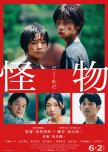
Esta resenha pode conter spoilers
“Who’s the Monster?”
“You have an amazing talent”“Do I bite and poison others?”
“No, but when you’re attacked you let go of all your strength and give up”
“That’s not a strength”
“You stop feeling”
“Am I Hoshikawa Yori?”
I really couldn’t put it into enough words how phenomenal this movie was in the sense that it just, completely overwhelmed me. The thing about children is that yes, their worldview differs from those that are older than them, and yes maybe they don’t, perhaps, fully understand the complexities of life as adults, But i feel that more often that not, children are aware of things; they think and feel and process feelings just as we adults do too. However, there’s a certain rawness, a brutality to the truth that they don’t avoid.
Listening. To not simply hear what is being told to you, but to truly listen and understand. Throughout the entirety of this movie we are led to believe that there is one big mystery that must be revealed. Is Mr Hiro truly the “Monster” that he is portrayed to be, or is the monster Minato? Perhaps even Yori? At different points in the film we are led to believe that this ugly truth could be that this was either a detailed scheme conducted by two disturbed young boys looking to wreak havoc, or that there was a cruel teacher who has been abusing his authority and his pupils. We are even led to believe that Minato could be monster who had been caught by a classmate killing a cat (Allegedly). We see as Minato’s mother Saori jumps through hoops to defend her son from who she believed to be a monster, an abusive monster: Mr Hori. She searches for answers that would support her beliefs and feeds them, recklessly discarding anything that doesn’t align with her version of events. A notable example of this would be when the possibility of her son being the “monster” is suggested to her but she vehemently rejects this idea completely. In an attempt to prove Mr Horims guilt and in turn, Minato’s innocence, she visits Yori and instead of listening to him, gets him to corroborate a story that paints Mr Hiro as the abuser.
Now, Mr Hiro can indeed be seen as a victim here as he goee through his fair share of suffering as a result of false accusations. However, he is not completely innocent and also fails to pay attention and listen. Listen to the children. After being accused by Minato and his mother of physical abuse, he pleads his innocence adamantly, failing to realise that his actions come across aggressive and unhinged especially towards the children. Hori begs for the testimony of a student of his who states she witnessed Minato hurt a cat and begs her to show that he isn't the monster everyone claims that he is, but rather that Minato is. Here is one of the many mistakes the adults in this film make. They fail to listen. Yes they hear what these children tell them, but they only hear what they want to hear, which is why when he begs her to tell the principal that she saw Minato kill that cat, to prove his innocence she claims that, that is what she said, and she would be correct. At her response he lashes out and she is frightened. What all these adults fail to recognise all along is, that the real ‘monster’ had been there all along. Right under their noses.
Saori visited the house of the monster, and hell, Mr Hiro even met him himself. If they had not been so caught up with their own problems, fuelling their own narratives, they would have recognised the bigger issue at hand: Yori’s abusive father, The Real Monster. Upon visiting Yori’s house, Mr Hiro hears the words that started this all, come out of Yori’s father’s mouth. “His brain has been switched with a pig’s”. Yet Mr Hori doesn’t question this, or even attempt to connect the dots. Saori saw the burn marks and bruises littering Yori’s body, and rather than asking who they were from, or why he was so comfortable being left at home for long periods of time, she asked if it had been Mr Hiro who had inflicted the wounds. Another failure, another missed chance to save Yori from the monster.
For Yori and Minato, there was no doubt in their mind who the monster was, and they had not once wavered from their belief in this. For these two boys, the truth was so abundantly clear to them, the monster was Yori’s father. Whatever was going on with Mr Hori, With Minato’s mother, with the school, it didn't concern them, all that mattered was that they had each other and their special place, their escape from judgement, from lies and pain.
We are given several examples throughout the film, of this raw truth that children possess. Minato tells his mother “I’m not like dad” the truck sound conveniently passing by as Minato tells her something that he’s been holding back for so long, once again Saori fails to hear what it is that he’s really trying to tell her. It can be argued that it was either the loud sound of the truck To listen. Minato wasn’t trying to tell his mother that he wanted to be like his father, or get muddy like his father, or play rugby like his father, but he was telling her he isn’t like him. He doesn’t love in the same way his father did. In the way his father loved his mum. He tries to tell Saori he loves another boy, that he doesn't love a woman like his father did. and that is why he tells her “I’m not like dad” The raw truth. If only Saori had heard, had truly listened, had asked what this all meant,
Would we be fair in assuming that maybe, just maybe things could have panned out differently?
Esta resenha foi útil para você?





